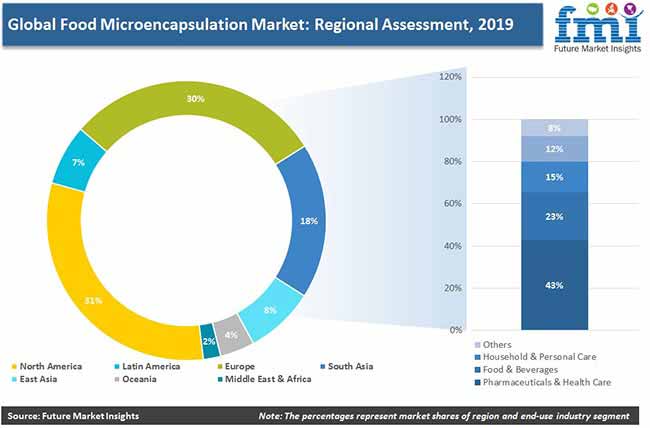The global food microencapsulation market size is expected to reach US$ 13.3 Bn by the end of 2029. According to a study by Future Market Insights (FMI), the market will show a steady rise Future Market Insights in its recent report has predicted the market to showcase an impressive CAGR of at 9.6% CAGR between 2019 and 2029.
The food microencapsulation market is likely to benefit from strategic partnerships forged between industry partners and technology users. With companies looking at investing in research and development to boost efficiency, the future of the food microencapsulation market seems very promising.
The report offers a comprehensive overview of the market, covering key growth drivers, restraints, opportunities, and prevailing trends. It uses unique research methods to offer the most accurate analysis of the market.
However, a coronavirus outbreak might impact the growth of the market. The report covers chief growth drivers and key restraints influencing the market’s overall trajectory. It has been compiled with the intent of examining investment feasibility in the market across various regions and segments.
It includes in-depth insights into the food microencapsulation market. Some of these are:
- The estimated value of the market was at the food microencapsulation market stood at a value of US$ 5.3 Bn in 2019. Through the course of the report’s forecast period, the market is likely to exhibit to a steady pace of growth.
- However, supply chain disruptions and decelerated demand due to coronavirus outbreaks may negatively impact growth.
- Regionally, North America has emerged as a key market for dominance in the global food microencapsulation market.
- The Asia Pacific is anticipated to increase the usage of exhibit increasing use of microencapsulated products. The rising awareness due to the growing awareness about health and welfare among individuals in its developing nations of India, China, and Japan will boost the update of the microencapsulation process in the regions.
- Key players are likely to focus on product innovations and business collaborations to stay relevant in developed markets. Key players operating in the market are expected to focus on strategic collaborations to expand their geographic footprint.
Request a report sample to gain comprehensive market insights @
https://www.futuremarketinsights.com/reports/sample/rep-gb-11258
“Food and beverages and pharmaceutical industries are among key end users of microencapsulation process. Manufacturers in the food and beverages sector are focusing on ensuring better nutritional value in their products, which will in turn create growth prospects for the market,” said a lead analyst at FMI.

COVID-19 to Hamper the Growth of the Food Microencapsulation Market
Previously deemed resistant to economic instability, increasing unemployment, declining competition, and supply chain disruptions have affected industries. Moreover, lockdowns following aggressive social distancing by governments, to mitigate the spread of COVID-19 globally, are likely to hamper the near-term revenue growth of the paper cups industry.
Supply chain disruptions caused due to extended periods of lockdown have in turn stirred unrest among suppliers as well as end-users. The true measure of potential recovery can be determined only after economies resume their normal course of operations. Furthermore, travel bans and restrictions imposed by governments around the world are hampering the market growth.
For Information On The Research Approach Used In The Report, Ask Analyst @ https://www.futuremarketinsights.com/ask-question/rep-gb-11258
Who is Winning?
Key players operating in the global food microencapsulation market are BASF, Royal Friesl and Campina, Syngenta Crop Protection, Koninklijke DSM, Givaudan, Firmenich, Symrise, International Flavors & Fragrances, Sensient Technologies, Lycored Corp., Balchem Corporation, Encapsys, Arcade Beauty, and Koehler Innovative Solutions, and among others. In order to enhance their market position in the global food microencapsulation market, key players are now focusing on adopting strategies such as product innovations, mergers & acquisitions, recent developments, joint ventures, collaborations, and partnerships.
Get Valuable Insights into Food Microencapsulation Market
Future Market Insights, in its new report, presents an unbiased analysis of the global food microencapsulation market, covering historical demand data and forecast figures for the period between 2019 and 2029. The study divulges compelling insights into growth witnessed in the market.
The global food microencapsulation market is segmented on the basis of technology, core material, shell material, and application. Based on technology, the market is segmented as spray technologies, emulsion technologies, dripping technologies, and others.
On the basis of the core material, the market is segmented as agricultural inputs, food additives, pharmaceutical & healthcare drugs, fragrances, phase change materials, and others.
The market on the basis of the shell material is classified as polymers, gums & resins, lipids, carbohydrates, and proteins. By application, the market is segmented as pharmaceutical & healthcare products, food & beverages, household & personal care products, agrochemicals, construction materials, textiles, and others. Regionally, the market can be segmented into North America, Latin America, Europe, East Asia, South Asia, Oceania, and MEA.
About Food Market Division at FMI
Expert analysis, actionable insights, and strategic recommendations – the food & beverage team at Future Market Insights helps clients from across the globe with their unique business intelligence needs. With a repertoire of over 1,000 reports and 1 million+ data points, the team has analysed the food & beverage industry lucidly in 50+ countries for over a decade. The team provides end-to-end research and consulting services; reach out to explore how we can help.